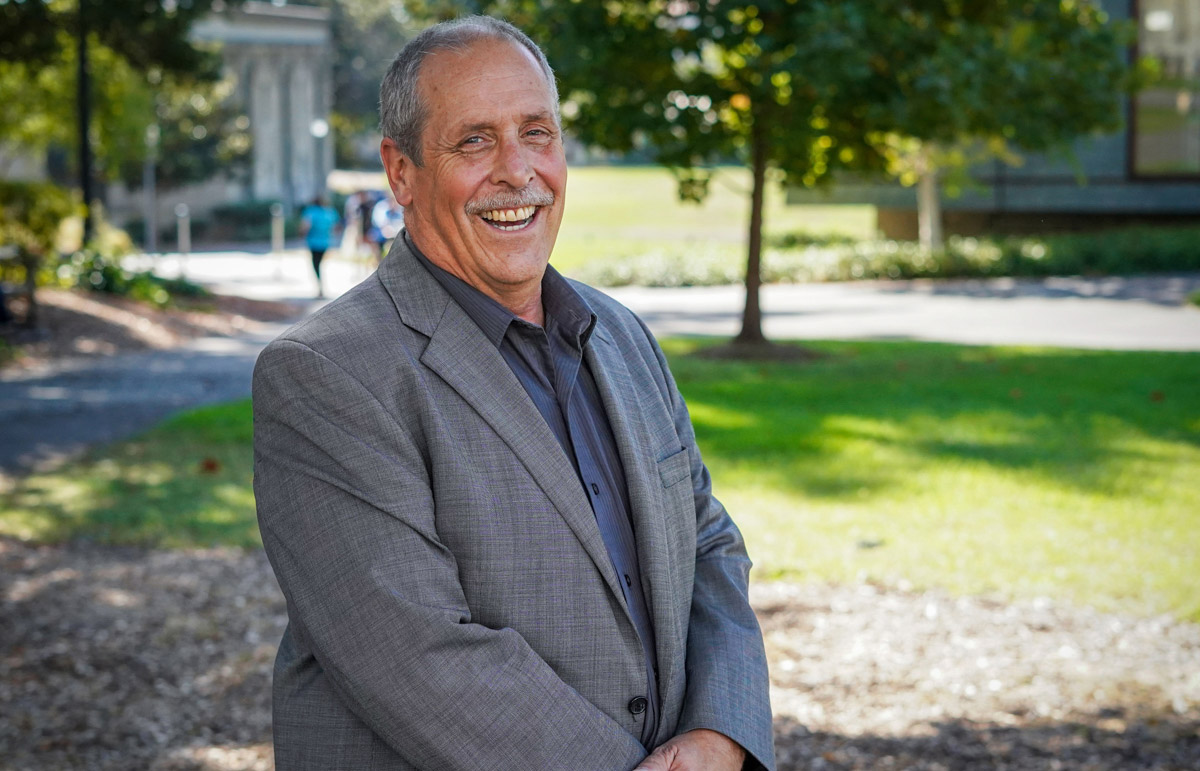
David Eifler wants to give UC Berkeley what it gave to him: opportunity.
“I first came (here) when I was 19, and Cal took a chance by admitting this scrappy kid from New Jersey in the middle of the academic year,” said Eifler, the university’s environmental design librarian.
Eifler has spent his 15 years with the UC Berkeley Library paying that opportunity forward, providing exemplary service and building community in the Environmental Design Library, across campus, and beyond.
This week, Eifler will be honored for that work as he receives a Distinguished Librarian Award (DLA). He joins an illustrious list of recipients recognized for their commitment to fulfilling the twin missions of teaching and research at the university. Elliott Smith, the emerging technologies and bioinformatics librarian at UC Berkeley, is the other DLA winner this year.
The biennial accolade — funded and presented by the Librarians Association of the University of California’s Berkeley chapter — has recognized excellence in librarianship since 1990. Honorees are selected by a committee of peers and faculty members.
2022 Distinguished Librarian Award ceremony
Where: Morrison Library (in Doe Library)
When: Friday, Dec. 9, 4-6 p.m.
Speakers: Senior Associate University Librarian Elizabeth Dupuis, Chancellor Carol T. Christ, LAUC-B Chair Jesse Silva, and more.
“This year’s winners distinguished themselves in the areas of innovation and diversity, equity, inclusion, belonging, and justice,” said Ramona Collins, law librarian and chair of the selection committee for 2022. “David exudes inclusiveness as he builds community in his library.”
We caught up with Eifler to learn more about what drives him, his most memorable achievement at the Library, and what he digs (literally, in this case) outside of work.
What do you like most about your job?
I became a librarian out of a personal desire to support one of our society’s most important social commons: the free and accessible knowledge embodied in the diverse collections of our public and academic libraries. I love sharing this accumulated wealth of knowledge with undergrads, grad students, postdocs, and faculty members, and helping them navigate the richness of our collections in support of their work. I feel privileged to come to work and be surrounded by bright minds committed to understanding the world and addressing its challenges.
Which of your accomplishments at the Library makes you proudest?
Since Phoebe Hearst first funded it in 1905, the Environmental Design Library has been built and curated by many notable librarians — most recently Elizabeth Byrne (also a DLA winner). They created one of the most renowned design libraries in the country. I’m proud of maintaining and enhancing our stellar collections, and in more than doubling our patron usage by expanding seating, hours, and programming during a period of declining material support.
For a smaller subject library, the Environmental Design Library continues to be a lively yet studious, austere yet artistic hub of activity with rich print and digital collections that support the pedagogical goals of the College of Environmental Design and the university.
What do you do for fun outside of work?
I’m a big advocate of permaculture and try to practice it in my backyard urban garden, which has been a solace to me, especially during the pandemic. I also enjoy the quiet exuberance of long road trips, something I probably learned to appreciate in my youth when I hitchhiked coast to coast numerous times.
How does it feel to be honored with a Distinguished Librarian Award?
It’s an honor to get such recognition from my librarian peers, whose work I deeply respect and admire. I also have a tinge of impostor syndrome, which seems to be ubiquitous at Cal; I’ve known highly regarded senior faculty who still grapple with it. Additionally, our profession is somewhat self-effacing, so accepting honors doesn’t come to us naturally. That said, hearing that I was one of the two honorees of the DLA brought tears to my eyes. I told my son, who plays in the National Football League, that receiving the award felt like being selected MVP of the Super Bowl. I am honored beyond words to receive this recognition from colleagues in such a noble profession.
Talk about your work as a community builder on the Cal campus.
Berkeley has so many talented people, plus a richness of history and amazing library resources. It’s actually quite easy to bring them all together to build community. I’ve tried a lot of things, many at the suggestion of other people: author book talks; “Hands On” exhibits, where we display artists’ books and talk over wine and cheese; documentary movie nights; and presentations by alumni. Some have been great successes, with 70 to 80 people attending, and others abject failures. (We had one event where only one person showed up, and they left midway through.) But almost all of them have created connections among patrons and library staff, and increased the number of patrons that visit the Environmental Design Library.
One of your colleagues described you as “committed first and foremost to the student educational experience.” Tell us more about the experience you had this year working with interns from the Undergraduate Research Advocates Program.
It was actually the idea of another previous DLA winner — Susan Edwards, head of the Library’s Social Science Division — to start a pilot Undergraduate Research Advocates internship, working with students from Berkeley’s NavCal program. But she gave me agency to run with it.
We provided stipends to three student interns to help us reach out to some of Berkeley’s nontraditional students. Being a multicultural, multigenerational group just returning to campus (post-COVID closures) was challenging at times, but I think we developed a real fondness for one another, and, despite my best efforts to lead the process, I’m pretty sure I learned more from them than they did from me. We made some changes to the library space to make it more welcoming, and the interns provided instruction to their peers, which was very successful.
This Q&A was edited for brevity and clarity.